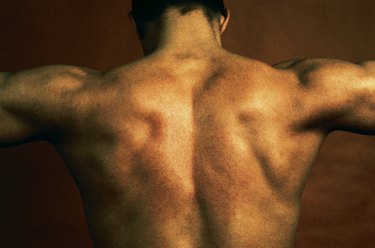
A proper diet helps you maintain lean muscle mass, lose fat and achieve proper hormonal function. In men, eating the right foods ensures that the testicles secrete an adequate amount of testosterone. While no foods can cause you to produce an abundance of testosterone, select foods high in the certain fats, vitamins and minerals bring previously low levels up to normal. Consult a health care practitioner before beginning any dietary program, and if you feel you have low testosterone levels, see a physician.
Testosterone
Video of the Day
Testosterone in men is produced in the testes. Testosterone remains a critical component of muscle growth, immune system function and sexual health. Low testosterone levels can lead to weakness, depression, muscle wasting and sexual dysfunction. Low testosterone secretion can also lead to loss of skeletal mass, a decrease in cognitive -- or brain -- function and an increase in the rate of male pattern balding. Testosterone levels begin to decline in men at approximately 40 years of age, according to the "Textbook of Biochemistry with Clinical Correlations."
Video of the Day
Fats
Fat is essential for testosterone production. Your body will covert fat, particularly dietary sterols -- or cholesterol -- to steroidal hormones. This is one of the reasons why a low-fat diet can lead to a decrease in testosterone secretion. Choose fats from healthy sources, such as omega-3 fatty acids, which are found in oily fish such as salmon. Other rich sources of omega-3 fatty acids are found in nuts, seeds, olives and olive oil.
Vitamins
Vitamins A and D are both fat-soluble vitamins that your body stores for later use. Both vitamins contribute to your ability to produce testosterone. Vitamin A is found in carrots, calf's liver, spinach, sweet potatoes and kale. Vitamin D is critical for testosterone production, and low vitamin D levels contribute to lower testosterone levels, according to a 2011 study published in "Hormone and Metabolic Research." Vitamin D is found in oily fish, such as fish that contain omega-3 fatty acids, making salmon and cod even better dietary choices. Vitamin D can also be found in liver, milk and eggs.
Minerals
Both zinc and magnesium contribute to your ability to produce testosterone. Zinc is critical in the formation of testosterone from dietary sterols. Zinc is found in high concentrations in oysters, veal liver and roast beef. Various nuts and seeds have high levels of zinc, including watermelon seeds and pumpkin seeds. Magnesium is found in tuna and halibut, bananas and figs, and milk. Many grains, nuts and vegetables contain magnesium, including most leafy green vegetables.
Is this an emergency? If you are experiencing serious medical symptoms, please see the National Library of Medicine’s list of signs you need emergency medical attention or call 911.